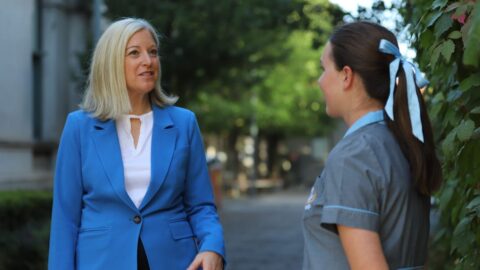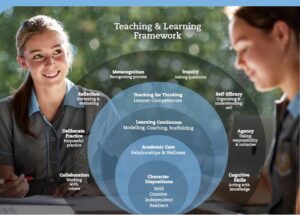Student Agency in Learning – Claiming a Seat at the Table

“When students are agents in their learning, they are more likely to have ‘learned how to learn’ – an invaluable skill that they can use throughout their lives.”
OECD, 2023
What is Student Agency?
The Organisation for Economic Cooperation and Development (OECD) 2030 Report discusses that Student Agency is founded on the principle that students have the ability and the will to positively influence their own lives and the world around them. It is defined as the capacity to set a goal, reflect and act responsibly to effect change. It is about acting rather than being acted upon, shaping rather than being shaped, and making responsible decisions and choices rather than accepting those determined by others.
 At St Catherine’s I am acutely aware of developing programs and curriculum where students are agents in their learning, where they play an active role in deciding what and how they will learn. This approach allows for greater motivation to learn through setting goals for their learning. Our Teaching for Thinking Agenda supported by our Teaching and Learning Framework allows students to “learn how to learn” – an invaluable skill that they can and will use throughout their lives. To develop agency, teachers and students become co-creators in the teaching-and-learning process.
At St Catherine’s I am acutely aware of developing programs and curriculum where students are agents in their learning, where they play an active role in deciding what and how they will learn. This approach allows for greater motivation to learn through setting goals for their learning. Our Teaching for Thinking Agenda supported by our Teaching and Learning Framework allows students to “learn how to learn” – an invaluable skill that they can and will use throughout their lives. To develop agency, teachers and students become co-creators in the teaching-and-learning process.
What does Student Agency look like at St Catherine’s?
At our School, students are active participants in their own learning and wellbeing. We give them authentic student decision-making over matters that affect them and encourage active student participation to foster connectedness. In order to exercise agency to the full potential, students need to build foundation skills and step into this learning through our bespoke programs that focus on student agency and voice.
Teaching for Thinking –Strategies for Developing Agency in Learning
Our Teaching and Learning Framework adopts a classroom pedagogy that is built on the strategies of modelling, scaffolding and coaching to develop student agency in learning. Every teacher creates a culture of thinking that allows students to develop a growth mindset and ownership of their learning.
- Teachers adopt a culture of high expectations where responsibility and initiative are the norm. Explicit teaching and thinking routines are modelled to allow for student release of responsibility rather than creating a culture of dependency.
- Teachers co-design learning goals with students and scaffold tasks to develop self-efficacy and agency.
- Teachers provide coaching through consultation, time for reflection and evaluation by students of their effort where they identify what they can do differently next time.
- Teachers and students become co-agents in the learning journey.
Academic Advisory Program
Our new bespoke Academic Advisory Program occurs once a week for all Years 7 to 12 students. It develops 21st Century academic skills that teach students the key learning strategies and character dispositions that can help them succeed in an academic setting. It draws on the connection between academic confidence and wellbeing and the evidence that learning ‘how’ to study, and thinking effectively contributes to greater wellness.
A consistent focus has been student agency in our weekly modules:
- Deliberate Practice and Agency – Study and Revision
- Digital Literacy – Agency and Cognition
- Agency & Collaboration in Academic Integrity
- Leading as a Learner: Collaboration & Inquiry Teacher & Student Partnerships
- Reflection & Goal Setting
These sessions allow students to develop agency in their learning and the development of key skills, stepping into understanding a strategy, applying it in their classes and then reflecting and evaluating on their learning and skill development. I am excited to observe the skill development of our students as they engage with this program and the learning that will take place in their self-awareness, initiative and perseverance, all key attributes of agency.
Student agency is about having a voice, being able to step into conversations, collaborate, problem solve and be creative. However, voice is also the ability to be silent, to actively listen, to understand and act with empathy. Dispositions that are so important in life beyond school. Skills which should no longer be defined as ‘soft skills,’ as they are key interpersonal skills that develop from social and emotional learning. At St Catherine’s we encourage all students to develop their agency and independence, to find their voice.
Some voices are centre stage in their agency, but we all know that in life’s production it is the whole cast that creates achievement and success, the leads and those backstage. We encourage all students to step forward away from the wings and have their moment centre stage in a class, a co-curricular activity and in life.
At St Catherine’s, we foster student agency that is fearless, where our students will claim a seat at the table, bring their voice and let that voice be heard. However, most importantly, we educate young women who we encourage, empower, and expect to achieve great things. Rather than claiming a seat at the table, they will redesign the table, with multiple seats for women.


